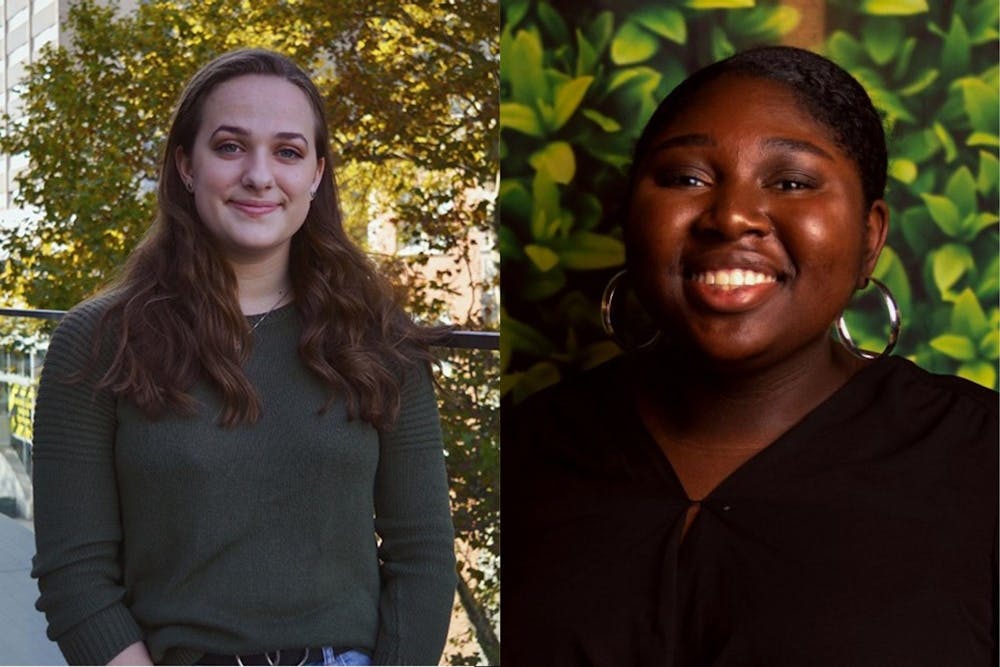Newly elected Undergraduate Assembly President and College junior Tori Borlase and UA Vice President and College and Wharton junior Janice Owusu plan to prioritize student wellness and administrative accountability next year.
Borlase and Owusu won the election to lead the student government branch on April 14 in a close race against College and Wharton junior Nikhil Gupta and College sophomore Gaby Montes. To implement their platform, Borlase and Owusu plan to pressure the University to include more student input in decisions and to create more opportunities for students to speak with and question administrators directly.
The two running mates campaigned on a four-point platform of diversity and community advancement, wellness and mental health, academic reform, and administrative accountability.
Borlase said that to accomplish their goals regarding diversity and community advancement, which include combatting Penn’s gentrification and pressuring Penn to pay Payments in Lieu of Taxes to Philadelphia, she plans to work with Facilities and Real Estate Services to create an advisory board on buildings and development at Penn.
The board, which would be known as the Space Steering Group, Borlase said, would consist of members from FRES and administration, as well as students and representatives from the West Philadelphia community. The group would provide input on new buildings and the use of space at Penn.
“One of the biggest problems that we have in terms of bigger decisions being made about the [Philadelphia] community or about the Penn community in general by [administration] is that there are not any avenues for input from the communities that are affected,” Borlase said.
Owusu added that she hopes to develop training modules for New Student Orientation to inform students about the West Philadelphia community and Penn's gentrification of the area.
To address student mental health, Owusu said that one of her biggest priorities is ensuring that Penn hires and retains more therapists and psychiatrists of color at Counseling and Psychological Services. She plans to meet with Chief Wellness Officer Benoit Dubé this summer — when most CAPS hiring takes place — to discuss the issue.
RELATED:
Faculty advocacy group outlines recommendations to govern course end times with new block schedule
Suspension of this year’s dean’s list leaves some students disappointed
She added that many of the staff members of color at CAPS are fellows, not permanent hires.
“That's been a struggle for a lot of students, because a lot of diversity comes through their fellows, but when those fellows are often moving up and down, it creates instability for the students as well,” Owusu said.
Borlase added that she and Owusu plan to advocate for Penn to encourage student wellness through the academic calendar as well. As of 2018, Penn has the fewest break days during the academic year in the Ivy League, and Borlase said that keeping engagement days in addition to standard breaks after the pandemic would benefit students.
“We don't place enough value on students' down time and taking breaks,” Borlase said.
Borlase’s and Owusu’s platform also focuses on holding administrators accountable — a frequent goal of student government leaders.
Owusu said that in her role leading UA Steering, which consists of more than 40 student groups who advise Penn Student Government, she hopes to continue the work done this year by College junior and former UA Vice President Mary Sadallah.
Sadallah regularly brought in administrators to UA Steering meetings, allowing members to ask questions, Owusu said. Next year, Owusu plans to continue this, but to bring the same administrators in multiple times throughout the year to allow student groups to follow up and pressure administrators about issues such as space for cultural houses on Locust Walk.
“Implementing [the changes to Steering] within the confines and the interim spaces where we're not getting those answers is going to be where we're definitely going to try to make a change,” Owusu said.
Both Borlase and Owusu emphasized their openness to student input and feedback during their term next year.
“Question us,” Owusu said. “Make sure that we're doing what you want us to do. Make sure that we are keeping up with our platform, because if we're not, then why did you elect us?”









